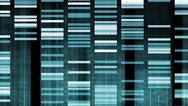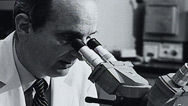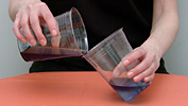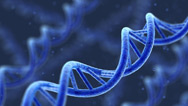Chemotherapy and Breast Cancer
- Posted 03.22.12
- NOVA
It used to be standard practice that all patients received chemotherapy after surgery to prevent the recurrence of breast cancer. Today, a genetic test called Oncotype DX allows doctors to analyze the genome of a patient's cancer cells. The results can help oncologists determine whether a patient actually needs to endure chemotherapy post-surgery, thereby avoiding needless suffering.
Transcript
MINIMIZING CHEMO
PBS Airdate: March 22, 2012
NARRATOR: For years, chemotherapy has been prescribed for breast cancer patients after surgery with the hope that it will reduce the risk of recurrence. Despite grueling side effects, it has been the default treatment, even though for many patients the benefits are nonexistent.
HAROLD BURSTEIN (Dana Farber): A common estimate is to say that the chemotherapy prevented 4 or 5 recurrences out of a 100 women. But there is a terrible sense that if you didn't do something and the cancer came back that one would feel awful, that you would have let down yourself and your family. So, people are terrified of breast cancer and understandably are willing to undergo real ordeals with chemotherapy for benefits that might seem really small.
NARRATOR: One such patient is Connecticut lawyer Allison Reilly Bombara.
ALLISON REILLY BOMBARA: When I was told that I had breast cancer, I immediately wanted to do every possible thing to get rid of it. I started imagining what color wig I would have. I started thinking about multiple shades and pony tails and all sorts of bizarre things. So it wasn't the fear of the treatment, it was more the fear of I have to do enough for myself to make this go away.
NARRATOR: But when she meets with oncologist Harold Burstein, Allison finds that the old advice, "Endure chemo just in case," no longer applies.
BURSTEIN: So the actual score from Genomic Health on the test was 5. Which puts you at a very low risk for breast cancer recurrence, which is really fantastic.
BOMBARA: Oh that's wonderful.
NARRATOR: Burstein has been giving patients like Allison a test called Oncotype DX, which looks at the expression of 21 genes in certain breast cancer tumors. The patient then receives a score from 1 to 100, which gauges how aggressive their cancer is and whether they need chemotherapy to keep it from returning.
BURSTEIN: ... If I had something that even made 1 or 2 % benefit chance for you, that you would do it. You would walk across hot coals. You would swim with sharks. You would do whatever we said to optimize...
BOMBARA: There was a small moment where I said, "Are you sure, don't you want me to have chemo?" Once upon a time, everybody did that. Everybody went and had chemo once they got cancer.
BURSTEIN: So, to be able to have great results while doing less is sort of every oncologist's dream. It's a nice place to be.
BOMBARA: That's terrific. That's really wonderful.
BOMBARA: It's a comfort, if you can put it that way, to get a disease like this today instead of a decade ago.
Credits
PRODUCTION CREDITS
- Original interview by
- Sarah Holt
- Production help from
- Adam Talaid
- Original Footage
- © WGBH Educational Foundation
Related Links
-

Cracking Your Genetic Code
We are on the brink of a new era of personalized, gene-based medicine. Are we ready for it?
-

Cancer Warrior
Follow Dr. Judah Folkman's extraordinary quest to fight cancer by cutting off blood flow to tumors.
-

Extract Your Own DNA
Behold your very own DNA in this do-it-yourself science experiment.
-

Cracking the Code of Life
NOVA chronicles the race to reach one of the greatest milestones in the history of science: decoding the human genome.

